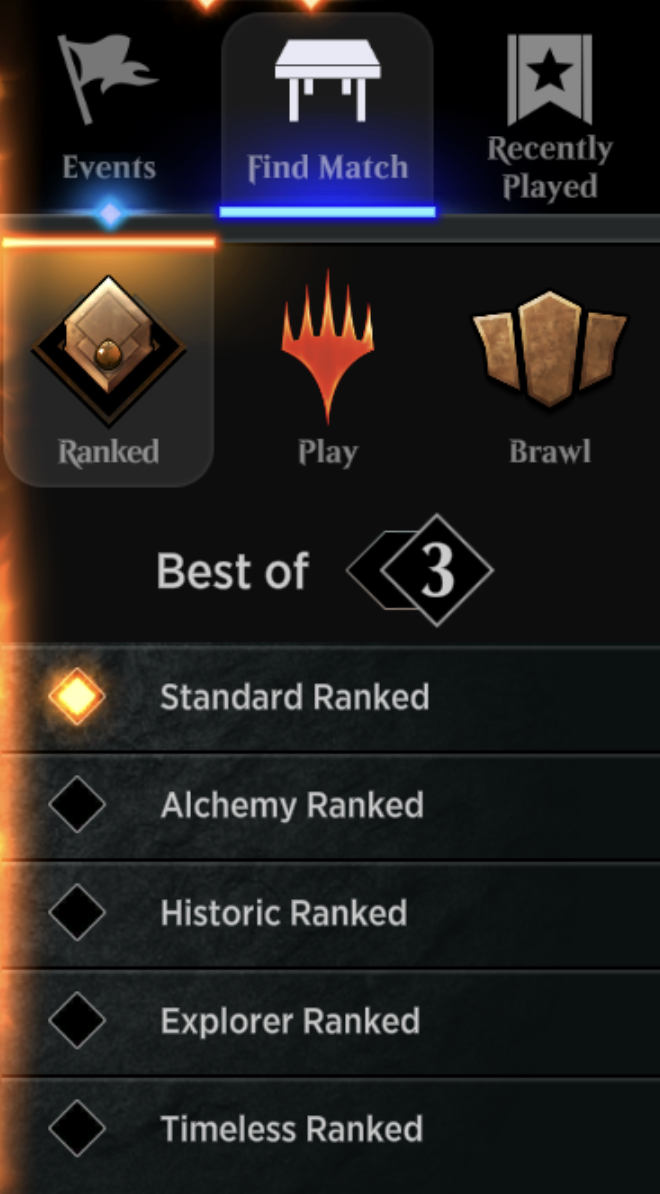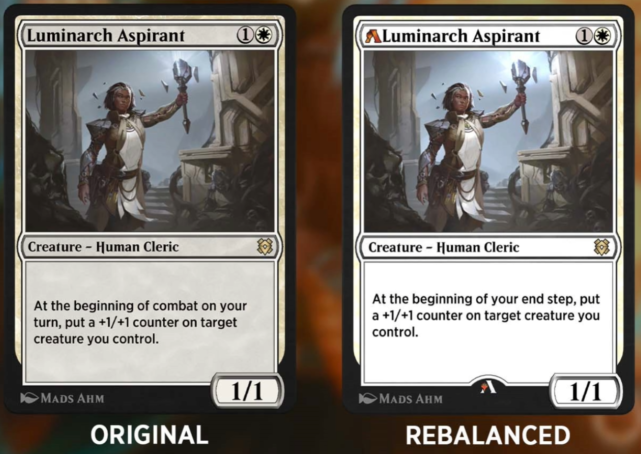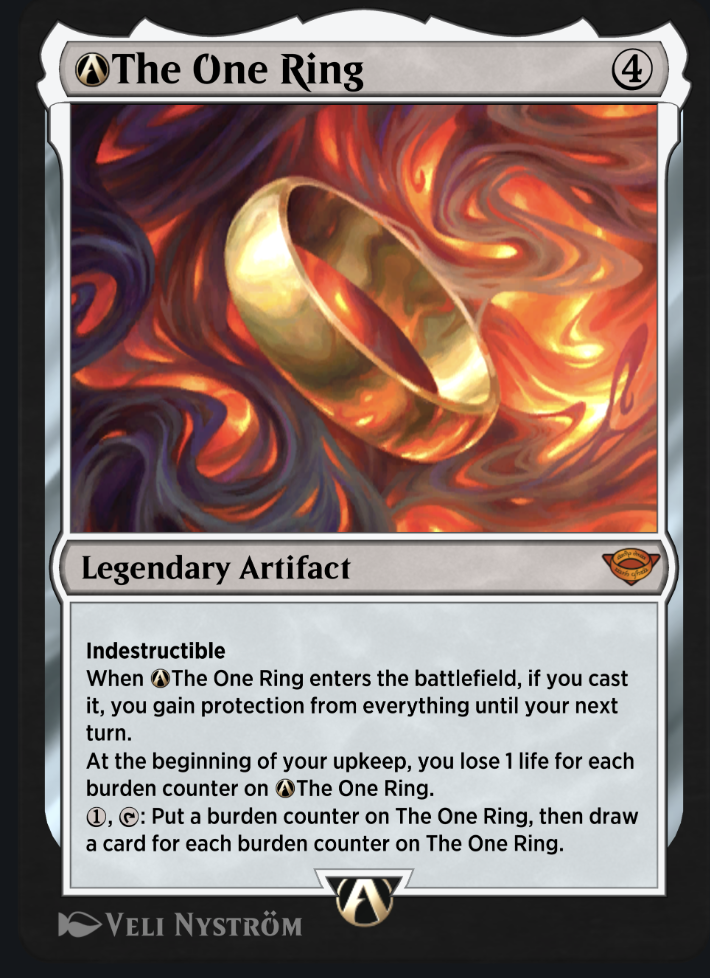Loading...
Products
Magic: The Gathering Line
I have a long history with online MTG. Although it was the paper cards that first made me fall in love with Magic, I’ve also played innumerable hours of online versions of the game. I first got on the Pro Tour via Magic Online, and I was the Magic Online champion back in 2011.

That said, I’ve always been a bit of a purist. I love tabletop Magic, and I love Magic Online because of how well it simulates tabletop Magic. As such, it took me a while to warm to Magic Arena.
Magic Online is meant to be a direct analog to tabletop Magic. Whenever possible, the cards work the same way, the rules are the same, and you can even pause to think (or bluff) according to the same timing. Magic Arena, on the other hand, is not designed with the same goal. Magic Arena is designed to be a fun, convenient, and user-friendly way to engage with Magic. As such, there are places where it intentionally diverges from the tabletop game.
Perhaps the best example is the timing on Arena. If you don’t have a play you can make, the software will blow through all of the places where you’d normally get a chance to act, in the interest of creating a fast and efficient game.
At first, this bothered me. I wanted to play Magic, not some new video game masquerading as Magic. Thankfully, I learned to shift my thinking and start viewing Magic Arena based on its own merits. It is indeed fast, fun, and user friendly, with its own skill set that makes great players admirable and difficult to defeat.
Consider this write-up to be a Magic player’s guide to Arena. What do you need to know if you’re jumping online for the first time and looking for a game?
First, what the heck does traditional mean?
If you’ve ever played a tabletop Magic tournament, then traditional–also known as best-of-three– will be familiar to you. It means you’re playing a two-out-of-three match with a sideboard, and no unusual rules. There’s no free mulligan, no extra starting life, nothing. It’s traditional.
On the other hand, if you join an event that’s not marked as traditional, then you’re playing best-of-one. There’s no sideboarding, and you can expect the match to be nice and quick.
There’s also a “hand smoother” in best-of-one. It doesn’t change the gameplay much, but it makes it so that you won’t have to mulligan quite as often. The rough gist of how it works is that the program will generate two sample opening hands, and then gives you the hand with a healthier mix of lands and spells with greater than 50% likelihood.
Some players like the hand smoother, and most never notice it at all. You should just be aware that it exists if you’re using Arena to practice for a tabletop event. There is no hand smoothing in traditional, best-of-three play on Arena.
Now let’s say you want to play a draft. All you want is to tear open some booster wrappers without needing to sift through a million different options and vocabulary words.
With what you’ve already learned, you can probably guess what Traditional Draft is. It’s an event where you draft with seven other human players, build your deck, and play three best-of-three matches with sideboards. The only note is that you won’t necessarily play against the players you draft with. (In this way it’s more akin to a Magic Online league than a tabletop booster draft).
Quick Draft has you drafting with bots, then playing best-of-one with other human players. It’s good for new players, or if you’re just looking for a crash course on the format. You’d probably get sick of it after five or ten runs, so I wouldn’t necessarily recommend Quick Draft for dedicated, high-volume players.
Premier Draft has you drafting with humans, then playing best-of-one against human players. If you want to play Ranked and level up on the ladder, you’ll have to play Premier Draft.
The Arena ladder is a fun matchmaking system that tracks your progress through six tiers: Bronze, Silver, Gold, Platinum, Diamond, and Mythic. You’ll be paired with opponents who are close to your tier. When you win a match, you improve your ranking a little bit; when you lose a match, you either lose a little progress or stay where you are. Once you reach the next tier, you can’t be demoted until the season resets the following month.
Arena tracks one ranking for Limited, and one ranking for Constructed. As mentioned, ranked Limited is only Premier, Best-of-One draft of the most recent expansion. Constructed, on the other hand, gives you many options. You can play either Best-of-One or Best-of-Three in five different formats, and they all count towards your same overall Constructed rank.

I’ll give you a crash course on each of the five ranked Constructed formats on Magic Arena.
Standard is the simple one, as it’s identical across Magic Arena, Magic Online, and tabletop play. Standard only allows cards from the most recent couple of years, making it the best entry point for players who are new to competitive Constructed.
You can find the list of Standard-legal sets here.
There are no cards currently banned in Standard as of October 2024.
One of the places where Magic Arena diverges most dramatically from tabletop MTG is in its Arena-only formats. Alchemy is one example, as you won’t be able to play it on Magic Online or in paper. There’s a different selection of legal cards, and sometimes a different banned list. In some cases, cards are even adjusted from their original printing!

Alchemy has a feature that cards can be changed–often for power level reasons–from their original printings. This would be effectively impossible for tabletop play because you can’t change what’s printed on the cards; the ink dries! But online, it’s possible for the programmers to make changes as often as they like.
Personally, I find this to be a promising idea. With more players playing more games of MTG than ever before, formats get solved very quickly. Within a week or two, everybody knows the best decks, and it’s possible for competitive play to become repetitive and stale. For a high-volume player like me, the ability to make frequent changes can mean keeping things fresh and interesting.
Alchemy starts as a direct analog to Standard, then diverges by incorporating digital-only cards and mechanics, plus rebalanced Standard cards. Like Standard, there are currently no cards banned in Alchemy as of October 2024.
In my mind, there’s one big miss in the execution of Alchemy: the price. Staying competitive in Alchemy requires a large expenditure of wild cards. You effectively need a Standard collection, and then an additional Alchemy collection. The card pool is deeper, and cards are printed more frequently. Importantly, your Standard cards are legal in Alchemy, but your Alchemy cards don’t work the other way around.
For a player like me, maintaining a collection across Arena, Magic Online, and tabletop is already expensive and exhausting. Now, there’s additional pressure to buy Alchemy-specific products whenever they’re released–so many players find it easier to just opt out.
I think Alchemy is a cool experiment, but it hasn’t caught on in a big way.
Instead, the format I’ve personally been enjoying the most is Explorer. Unlike Alchemy, Explorer is designed to mirror tabletop play. Every card that exists on Arena and is legal in Pioneer is legal in Explorer, and nothing more than that. Over time, Pioneer and Explorer have become closer and closer to one another.
Aside from a few cards here and there, the main difference between competitive Pioneer and competitive Explorer is that you can’t play the Lotus Field combo deck in Explorer.
As such, Explorer is fun as a stand-alone format, and also makes for effective cross-training for Pioneer players. Most recently, I’ve been playing Dimir Control.
Anything that’s banned in Pioneer is also banned in Explorer. You can find the banned lists for Pioneer, Explorer, and the two formats I’ll cover below by following this link.
The first ever Arena-only format was Historic, and it still has its die-hard fans. Every set that exists on Arena is legal in Historic, and the format doesn’t rotate, so it means your cards maintain their utility after they’re out of Standard and Alchemy.
Historic features engaging archetypes like Energy, Sacrifice, Izzet Phoenix, Control, and Collected Company strategies.

Like Alchemy, digital-only cards are legal, including rebalanced versions of existing cards. But unlike the final format I’ll cover, Historic has an extensive banned list.
You can read about it more here.
Timeless is Arena’s largest Constructed format, where every single card on the platform is legal. Every card that exists in paper uses its original, tabletop version. Digital-only cards from Alchemy and Historic are also fair game.
Three powerful and iconic cards are restricted in Timeless, which means they can only be played in one copy. These are Channel, Demonic Tutor, and Tibalt’s Trickery. (As of October 2024). But that means some of the most powerful Magic cards of all time, like Necropotence and Show and Tell are totally fair game! If you truly want to feel like a high-level wizard, then Timeless is the format for you.
Here’s a primer and a deck guide focused on the Timeless format, written by my teammate on Team CFB Ultimate Guard, Martin Juza.
I’m a big fan of these decks that use Brainstorm, Deathrite Shaman, and fetchlands. It feels a lot like playing the Legacy and Vintage tabletop formats!
As always, the greatest thing about MTG are the limitless possibilities, and the way each player can choose what’s most fun for them. If you love Historic, Alchemy, or Timeless – great! More power to you. If you prefer to opt out of the Arena-only formats and stick to Standard and Explorer, which mimic tabletop play, that works too. The point is just to have a good time, and find what gives you the most from your gaming experience.